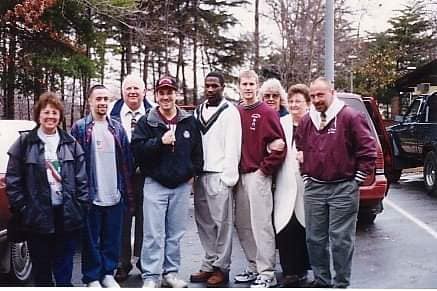
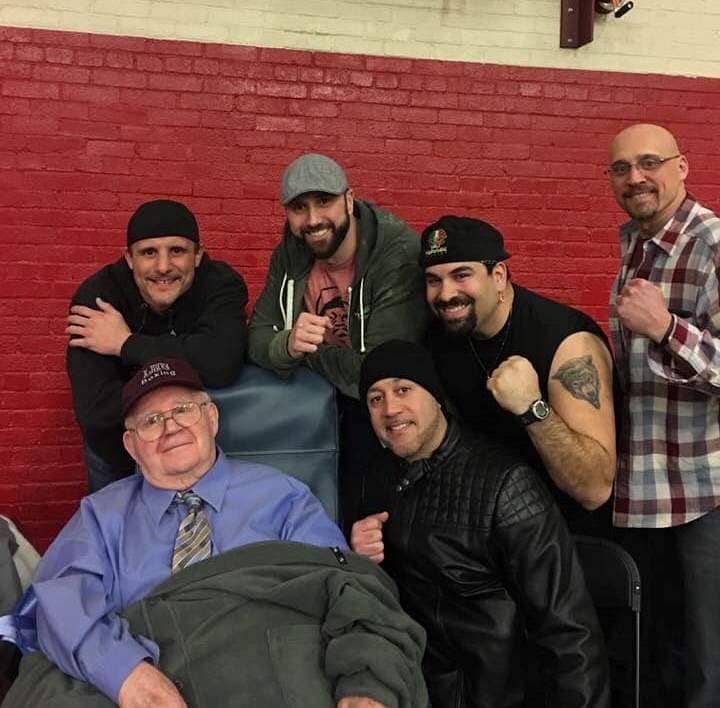
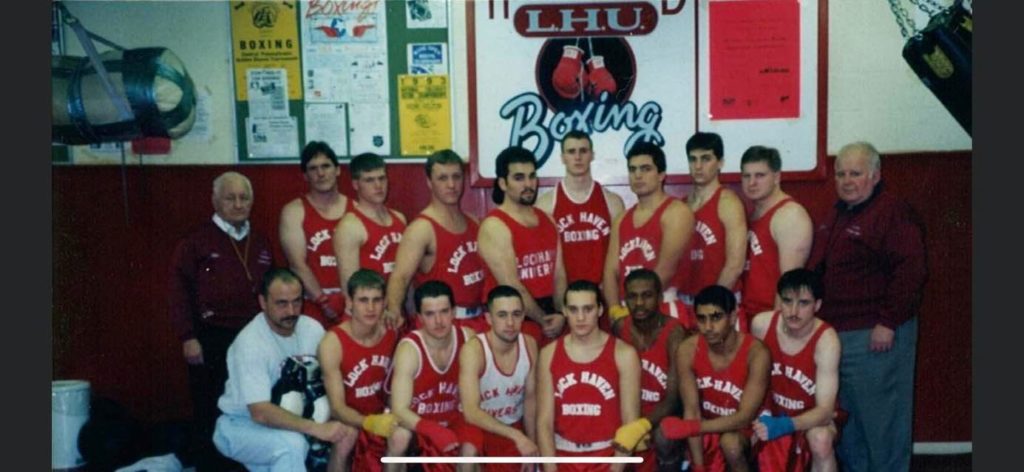
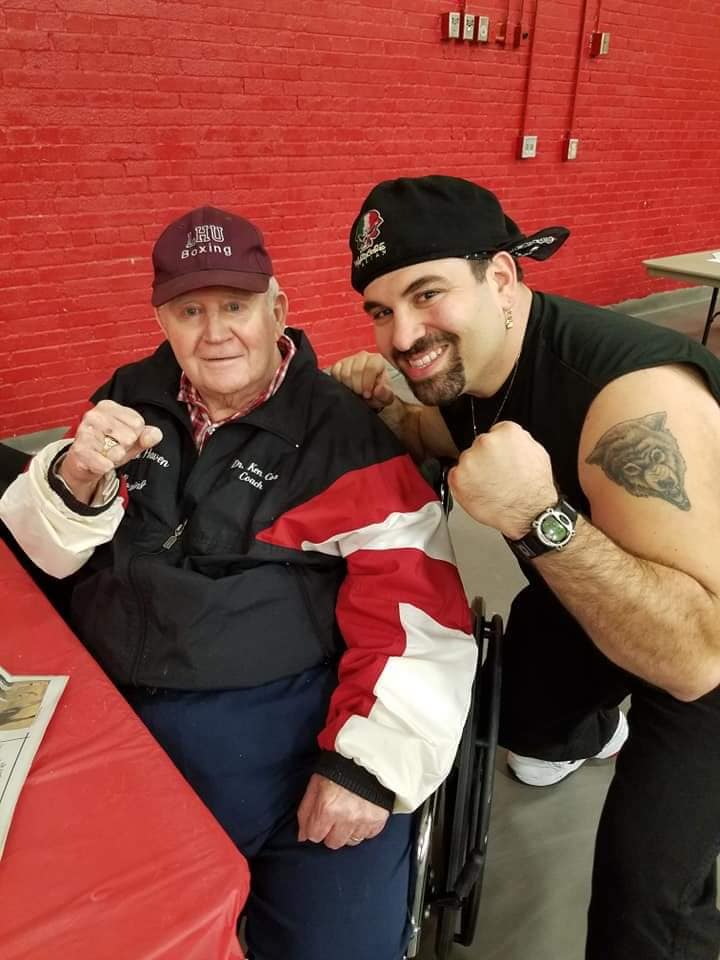
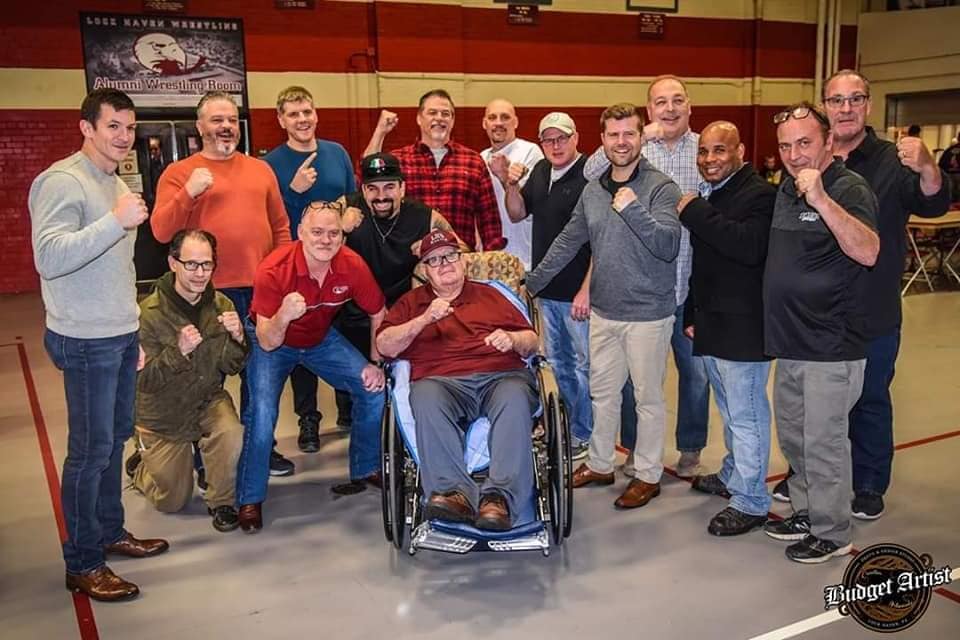
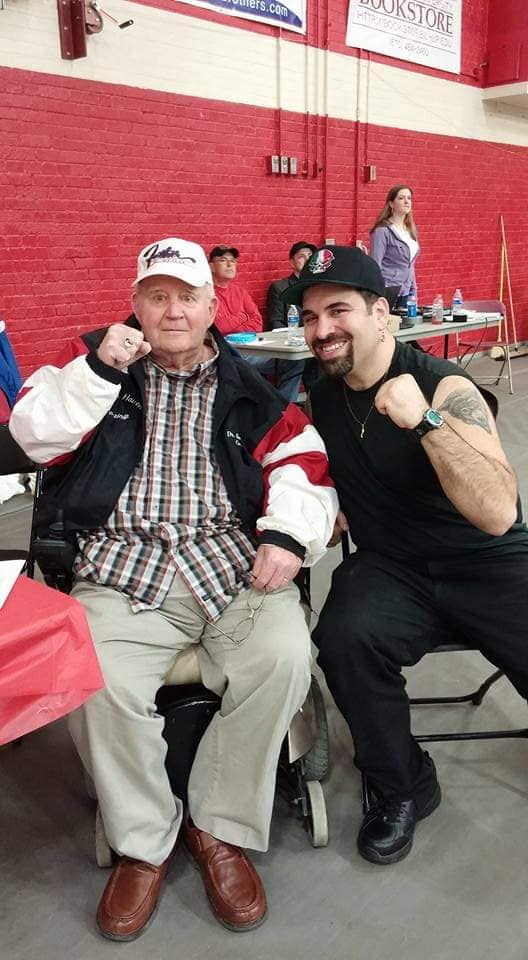
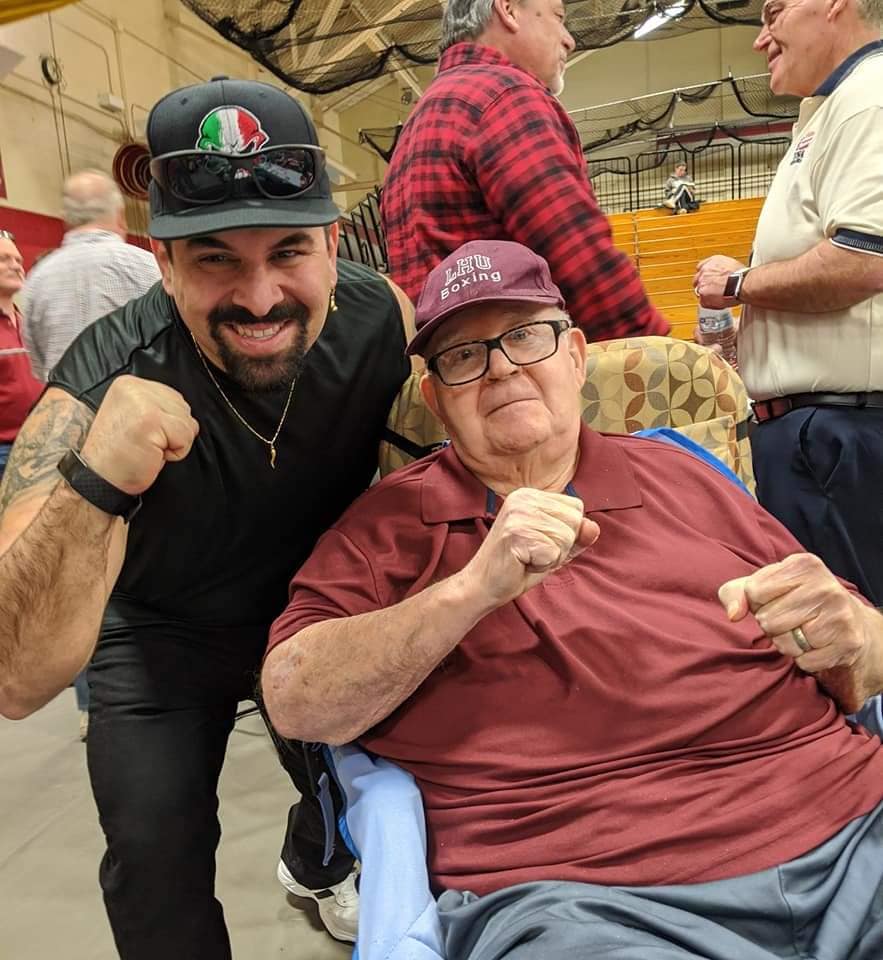
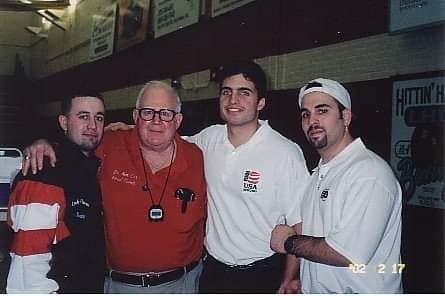
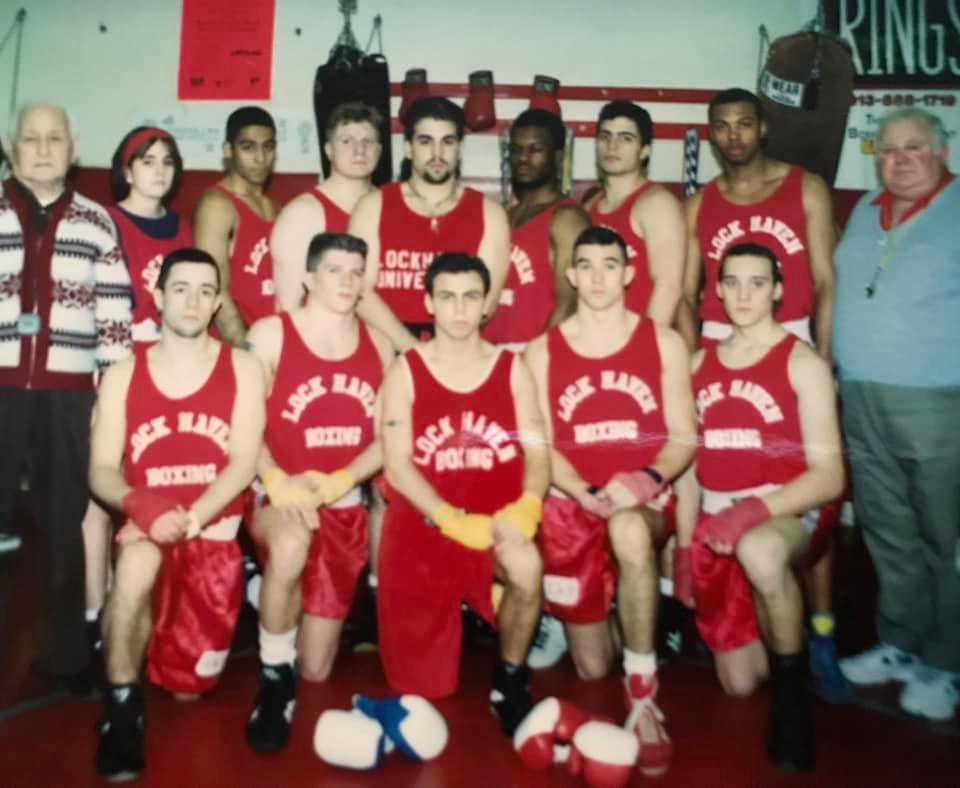
By: Tony Penecale
Lock Haven Boxing
Class of 1998
Dr. Ken “Doc” Cox was a legend of a man. He was a teacher, a coach, a mentor, a confidant, and a friend. He passed away on February 5, 2022 at the age of 88 years old, leaving a void in the hearts of all who knew him and loved him.
I’ve pondered over the last 24 hours how we are going to navigate through a world without Dr. Cox, aka “Doc”, a man who coached us, taught us, pushed us, and mentored us. He was a man that could light up a room and command attention. He could leave you hanging on every word as he shared life experiences or he could have you rolling on the floor, laughing until it physically hurt.
While his passing last night was not unexpected, it still hurt with the force of a thousand sledgehammers. I know I will likely break down and sob or flat out cry several times while I am writing this piece. There is definitely crying in boxing and tonight the Lock Haven Boxing and our extended collegiate boxing families are all in mourning.
Dr. Cox came into my life in 1994 when I was a freshman at Lock Haven University. I decided to go to Lock Haven, in truth it was my only choice, because I had become so enamored with the dream of boxing. When I found out that Lock Haven had a nationally-ranked team with a well-known coach, I set my heart on attending.
When I arrived on campus that fall semester, my first point of business was to seek out and meet Dr. Cox, armed with a list of excited questions. He agreed to meet with me a few weeks before he held the open meeting for prospective team members. I walked into the building where his academic office was located and it was then I saw a rotund man with white hair and a big smile on his round face walking towards me. I’m not sure who he was but it certainly couldn’t be this legendary coach. It was then he walked up to me and, in a voice that is so often imitated, he introduced himself. I did not realize then that I had just met a man who would so positively influence my life.
To know “Doc” was a true blessing in life. He could make you laugh or make you angry. He would call you out and put you on the spot. Being a professor, he valued education and he enforced that his student athletes, boxers at the time, and wrestlers before that, focused on their education. He would, without hesitation, withhold a competitor from a show or tournament if they were not keeping up with their academics.
He knew when to push you and exactly what buttons to push. He would bring the Lock Haven boxers to Rockview St. Penitentiary to train and spar with the inmates. The first time he brought me along, I was getting bullied and beaten up by an older and more experienced inmate. I was afraid and I kept looking over at him, in a way hoping that he would stop the sparring session. But he looked back and his eyes calmed me and I knew to throw a counter punch out of the corner. Dr. Cox believed in me at that moment when I didn’t believe in myself. A few years later, after me appointed me President of the Lock Haven Boxing Club, he asked me to submit the paperwork on which of his boxers he was selecting to compete in an upcoming show in New York. He also knew that I would see those papers so he wrote on there that I was “not nearly as talented” as another boxer on the roster. While we never spoke of it, he knew that he would ignite a fire in me to overcome my lack of natural ability through dedication and determination. It was just one of his many methods of motivation. As he would often say, he was “using a negative stimulus to produce a positive result.”
In essence, Dr. Cox was a giver. He shared his knowledge, his experience, and most importantly, his time to mold young men and women into competitive student athletes and decent human beings. He shared his family with us, including his wife Glenda, who was the driver (“the pilot”) of so many of our road trips. Those road trips, whether they were 45 minutes to Penn St. or several hours to Annapolis, were always entertaining life lessons. We were never allowed to sleep on those trips as “Doc” found this was the perfect time for education. He would discuss whatever topic hit his mind and they often came from left field. Those trips were never boring.
Dr. Cox always implored us to give back to the sport that gave us so much. He encouraged his student boxers to go into coaching and officiating, often allowing us to assist him in working the corner of one of our teammates, or setting up seminars so we could get our certification. He would, without question, gladly write a recommendation for a job or internship. He asked me to sit in his office while he wrote a letter of recommendation for me. He educated me on how to effectively communicate through the written word and focused on using “power” and “impact” words that would command attention and respect. He was always willing to be listed as a job reference because he wanted to see those who had trained and mentored become successful in life.
Since yesterday, I have been thinking a lot about my favorite “Doc” stories, the ones that I tell the most often. Of course, you can’t tell a Doc story without imitating his voice and mannerisms. Every year, when the LHU boxing alumni would gather for the annual boxing homeshow and after party, we would all tell our favorite stories while doing the Doc imitation. Sadly, the next time we gather will be for his funeral. This is a way for me to cope with his death and smile through the tears. These are in no particular order. For the most part, I will avoid using any names in the event someone doesn’t want to be called out.
- First Roadtrip and “Barnyard Beef” – My first roadtrip with Doc and the LHU team was October 1994 to the US Naval Academy. It was the annual season kickoff meeting and a round of sparring sessions with boxers from Navy, VMI, Lock Haven, Shippensburg, and Mansfield. It was a relatively uneventful day except for one of the Haven’s novice boxers had taken a few solid punches and was now complaining how bad his jaw hurt. On our way home, we were expecting to make a quick dinner stop, likely a McDonalds, until Doc spotted a little shack-looking place on the side of the road called “Barnyard Beef.” Once he saw it, he implored Glenda to cut off the driver in the right lane so we could pull over as he boomed “Hun Hun… That’s where we need to stop. It’s called Barnyard Beef. It has to be good!” He gave us all a few dollars to order and we all went with roast beef sandwiches with Doc getting an extra-large selection which looked to be about as big as the moon. Our sulking boxer implored that his jaw was too sore to chew so he opted for a cup of soup. Doc took the first bite of his gigantic roast beef sandwich and rolled his eyes in delight “Oh My God! This is the BEST roast beef sandwich ever” and looking over at his lone soup-eating boxer, he followed with “You gotta get one of these! Forget about your jaw! Stop being such a pansy and get one!”
- Mad in the Corner – As mentioned, Doc wanted to give his student boxers opportunities to learn to coach. There was a December card at Penn State my sophomore year where I and another teammate had our bouts canceled when our opponents from Buffalo were snowed in. Doc saw an opportunity to have us help in the corners with each of us taking two bouts and he would allow you to get in the ring and give the instructions. The first bout I worked with him was a clear Lock Haven victory. The second bout I worked with him did not go so well. The Lock Haven boxer was not doing well and certainly not up to his potential. Through the first round, I could tell Doc was getting angry. As the bell rang, he snarled “Let me have the ring” which was never a good thing. As I sat there, I made a vow that situation would never happen to me. Fast forward two months later, I am competing in that same PSU ring against a very sloppy and awkward opponent and the first round was going poorly, very poorly. The bell rung to end the first round and, as I started walking back to my corner, I saw Doc getting in the ring with a wild and angered look in his eyes. I almost considered walking to my opponent’s corner and asking if I could stay there for the next minute because I knew my corner was not going to be a fun place to be. In a crazy way, Doc’s unleashing on me actually forced me to refocus and allowed me to come back to win that one.
- President’s Dinner – At the end of every year, the president of the university would have a dinner for the boxing team. As Doc had retired as a professor in 1996, they decided that year that the dinner would not just be for the current team but also for some selected alumni. After the boxing nationals had ended in April, Doc was flying to Fiji for a few weeks to participate in a boxing seminar. He was scheduled to return only a day before the dinner banquet. We were waiting for him at the gym so we could travel to the dinner as a team. When Doc walked through the doors, our collective jaws hit the floor. He was wearing a suit jacket and tie and a traditional Fijian sulu. In our eyes, he was wearing something that resembled a skirt. He just smiled back and said “These are so comfortable. I think I am going to start wearing them more often.” To say his attire was the talk of the dinner was an understatement for sure.
- Pork & Beans – One of Doc’s defining characteristics in life was his generosity and willingness to help others. He had a close relationship with the local Salvation Army and every year, he would set up a day for the boxing team to ring the bells for the Salvation Army kettle. When Doc found out that one of his boxers was struggling financially and unable to afford food, he worked out a deal with the Salvation Army where they would donate some food for him. We were loading a box of groceries donated when this boxer who came from a Muslim family looked at the one item and declined it as it included pork. Doc picked up the can and said “Are you sure? How can you tell?” to which he was informed that it was a can of Pork & Beans. He pondered for a moment simply said “Hmmm… You know I never knew that had pork in it?”
- Don’t Eat the Pizza – We were traveling to New York for the annual show at the New York Athletic Center a few days before Thanksgiving. This was a rare show with the weigh-in the day before the show and the whole ride to Manhattan, Doc was talking about how we were going out to eat after the weigh-in. Since it was my first year competing on the NYAC show, he allowed me to choose the ethnic food we would be indulging in later. Of course, I picked Italian. Doc had one more very important piece of advice. After the weigh-in, there would be pizzas there. Even though we were all hungry from making weight for the show, he advised that we do not eat the pizza because we were going out to dinner. The three Lock Haven boxers made weight and, after changing, we walked over to find Doc eating his third slice of pizza. A short while later, we are seated at the famed Luna’s restaurant in Little Italy and Doc is complaining that he shouldn’t have eaten that pizza and he was too full to order a meal. The legendary Dr. Cox, the man who stories recount ate so much Chinese Food the year before, was reduced to ordering a side salad. As we were eating and laughing, Coach Ken Cooper made an astute observation. Doc had finished his salad and was now eating from his wife’s plate, all the while mentioning how he wasn’t hungry. Not missing a beat, Doc proceeded to take the extra meatballs from the one boxer’s meal.
- Cigars and Vodka –This is one that I didn’t get to witness personally but he told it so often that I felt like I was there. As a highly-respected wrestling coach, Doc was often invited to wrestling seminars in Russia where that sport is God-like. Doc was often the recipient of many bottles of the finest Russian vodka. He would attend boxing seminars in Cuba. Before flipping truck tires became a trendy thing in most fitness centers, Doc borrowed the Cuban method and would have his fighters bounce on truck tires to increase leg strength and conditioning. He also came home from many of these trips with some authentic Cuban cigars. He would tell us how he would then go to the store and buy the cheapest cigars and vodka, only to switch the labels. He would then imitate those smoking the cheap cigars and drinking the cheap vodka thinking they were consuming the real goods. He would pantomime their sipping of the vodka and slow puffing of the cigars while commenting “how you can really taste the difference”, his whole time cackling at the knowledge that he knew they were really gushing over the lowest quality of both items.
- Weight – It’s no secret, Doc wanted his boxers to compete in different weight classes. He also always envisioned a dominant heavyweight on his team and he would workout football players or wrestlers who had exhausted their eligibility in those respective sports. At the beginning of each school year, I would show up around 190-195 and Doc would envision me being his solution at heavyweight, despite the fact that I didn’t have the height, and once I started conditioning, the weight to sustain it. I still remember those conversations. “Ok Penecale, you weighed in at 185 for last week’s bout. What did you weigh today?” I would respond with “182” and he would shoot back “Ok, this week, I am going to put you in with a ‘small’ heavyweight.” When he meant “small”, it was usually anyone under 235 and I would show up to weigh-ins with rocks in my pockets. Then one day, only a few days before regionals, he decided to try another avenue. I had been between 178-180 and fully expecting to compete at 180 in the regionals when he asked “Do you think you can make 165 by Friday?” It was already Tuesday afternoon. He felt that was my best path to the National tournament so I agreed. In spring 1997, between January 30 and April 12, Doc had me compete in five separate weight classes.
- My last homeshow – Fitting that this anniversary is tomorrow (February 7) and I will be posting the Youtube video like I do every year. The homeshow was always a big event and Doc would want everything to be perfect. As Coach Coop would say to us, Doc would be very impatient or as so eloquently described “he would be a bear with a sore ass.” The last thing you wanted to do was annoy Doc before, during, or after the homeshow. My senior year, I was taking on a boxer from Army by the name of Michael Jordan. My friends and roommates showed up with custom signs and shirts and they were seated in the bleachers close to my corner. Earlier in the card, when I was getting changed, a boxer from Kentucky had knocked out an opponent from Penn State and drew the crowd’s ire by jumping on the ropes and showboating. I was unaware of this, so as the emotion hit me at the final bell, I banged my gloves and started a run to my corner to jump on the ropes and salute my cheering section. Doc read my mind and sternly said “NO!” which forced my momentum into an awkward gallop, looking like a bucking bronco that was just hit with a cattle prod.
The last two days have been emotional and difficult, from finding out that Doc was soon-to-be transitioning to the crushing news of his passing. Being an admin on the LHU Boxing Facebook page, one of the abilities is to approve posts. I saw so many posts submitted for approval from friends, family, fellow alumni including so many photos. It was nearly impossible not to break down.
Dr. Cox was a coach, an educator, a mentor, and a friend. As I first said in the post after his passing, he taught me so many lessons in and out of the ring. He believed in me even when I didn’t believe in myself. He pushed me to be better, a better boxer, a better student, a better son, a better friend, and a better human. Those life lessons still impact me every day and I find myself sharing them often.
Coach Cooper added in his tribute “He who is in the hearts of so many is never truly gone”. That is a true statement. Dr. Cox will live on through the positive impact that he has made through so many of his students, athletes, family, and friends.
You will certainly be missed, Dr. Cox. Thank you and We Love You!!!
